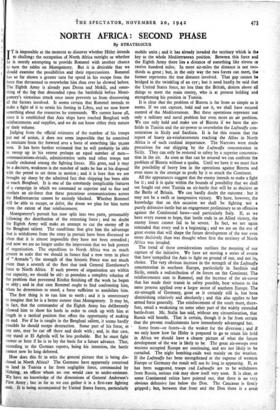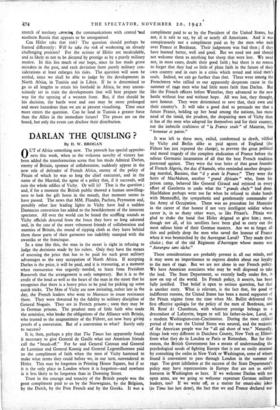NORTH AFRICA : SECOND PHASE
By STRATEGICUS Judging from the official estimates of the number of his troops put out of action, it does not seem impossible that he contrived to extricate from the forward area a force of something like 50,000 men. It has been further estimated that he will probably be able to sweep up in his retreat perhaps an equal number of men- communications-details, administrative units and other troops not usually reckoned among the fighting forces. His great, and it may be a decisive, weakness is the number of tanks he has at his disposal with the petrol to set them in motion ; and it is here that we are brought tip sharp by the admitted fact that shipping has been able to reach Benghazi. It is one of the constantly inexplicable features of a campaign in which we command so superior and so fine and resolute an air-force that these precarious communications across the Mediterranean cannot be entirely blocked. Whether Rommel will be able to escape, or defer, the doom we plan for him turns upon the extent of that reinforcement.
Montgomery's pursuit has now split into two parts, presumably following the distribution of the retreating force ; and no doubt the Eighth Army will make an attempt to cut the enemy off in the Benghazi salient. The conditions that give him the advantage that is withdrawn from the army in pursuit have been discussed so often that it is almost impossible they have not been remedied ; and now we are no longer under the impression that we lack powers of organisation. The expedition to North Africa was so much greater in scale that we should in future find a new term in place of " Armada "; the strength of that historic Force was not much more than a seventh of the fleet that took General Eisenhower's force to North Africa. If such powers of organisation are within our capacity, we should be ably to postulate a complete solution of the problem that prevented Ritchie finishing off the work he began so ably ; and in that case Rommel ought to find confronting him, when he determines to stand, a force sufficient to annihilate him.
The first thing is to run him to earth ; and it is unnecessary to imagine that he is a better runner than Montgomery. It may be, in fact, that the commander of the Eighth Army has deliberately allowed him to show his heels in order to catch up with him at length in a tactical position that offers the opportunity of making an end. For if he is caught in the Benghazi salient, it seems hardly possible he should escape destruction. Some part of his force, at any rate, may be cut off there and dealt with ; and, in that case, any stand at El Agheila will be less probable. But he must fight sooner or later if he is to lay the basis for a future advance. That, according to the German reports, being his intention, the battle cannot now be long deferred.
How does this fit in with the general picture that is being dis- closed in North Africa? The Germans have apparently contrived to land in Tunisia a far from negligible force, commanded by Nehring, an officer whom no one would care to under-estima We have no knowledge of the dimensions of General Anderson's First Army ; but as far as we can gather it is a first-rate fighting unit. It is being accompanied by United States forces, particularly
mobile units ; and it has already invaded the territory which is this key to the whole Mediterranean position. Between this force and the Eighth Army there lies a distance of something like eleven or twelve hundred miles. In mere air-miles the distance is not two- thirds as great ; but, in the only way the two forces can meet, the former represents the true distance involved. That gap cannot be bridged in the twinkling of an eye; but it need hardly be said that the United States force, no less than the British, desires above all things to meet the main enemy, who is at present holding and strengthening his position in Tunisia.
It is clear that the problem of Bizerta is far from as simple as it seems. If we can capture, hold and use it, we shall have secured control of the Mediterranean. But these operations represent not only a military and naval problem but even more an air problem. We can only hold and make use of Bizerta if we have the air- fields in Tunisia and the air-power to overwhelm the Luftwaffe con- centration in Sicily and Sardinia. It is for this reason that the report of heavy air-reinforcements reaching the Allies in North Africa is of such cardinal importance. The Narrows were made precarious for our shipping by the Luftwaffe concentration in Sicily. They can only be restored to safety by a superior concentra- tion in the air. As soon as that can be assured we can confront the problem of Bizerta without a qualm. Until we have it we must face the possibility of heavy loss in the operations against Bizerta and even more in the attempt to profit by it to attack the Continent.
All the appearances suggest that the enemy intends to make a fight for it ; and it is quite within the bounds of possibility that we shall see fought out over Tunisia an air-battle that will be as decisive as the Battle of Britain. We can hardly doubt the outcome but it may not be a swift or inexpensive victory. We have, however, the knowledge that on this occasion we shall be fighting not a purely defensive battle but an engagement preliminary to an offensive against the Continental bases—and particularly Italy. If, as we have every reason to hope, that battle ends in an Allied victory, the enemy losses cannot fail to be severe. • In fact, we are again reminded that every end is a beginning ; and we are on the eve of great events that will shape the future development of the war even more decisively than was thought when first the territory of North Africa was invaded.
The trend of these considerations outlines the meaning of our capture of the initiative. We have set moving a series of events that have'compelled the Axis to fight on ground of our, and not its, choice. The very obvious increase in the strength of the Luftwaffe concentration in southern Europe, particularly in Sardinia and Sicily, entails a redistribution of its forces on the Continent. The reinforcements sent to Rommel, and the increase of the air-cover that has made their transit in safety possible, bear witness to the same process applied over a larger sector of southern Europe. The air-strength of Germany, great as it certainly still is, has been diminishing relatively and absolutely ; and this also applies to her armed force generally. The reinforcement of the south must, there- fore, entail a weakening on some other part of the widely extended battle-front. Mr. Stalin has said, without any circumlocution, that Russia will benefit. That is certain, though it is far from certain that the present readjustments have immediately advantaged her.
Some front—or fronts—is the weaker for the diversion ; and if we only knew how far Hitler is prepared to go to retain his hold in Africa we should have a clearer picture of what the future development of the war is likely to be. The great. air-sweeps over western occupied Europe are continuing, and are not likely to be curtailed. The night bombing-raids wait mainly on the weather. If the Luftwaffe has been strengthened at the expense of western Europe or Germany the result will not be long in appearing. If, as has been suggested, troops end Luftwaffe are to be withdrawn from Russia, serious risk may show itself very soon. It is clear, as some Continental critics have pointed out, that there is no very obvious defensive line below the Don. The Caucasus is firm:), gripped ; but, between that front and the Don there is a great
stretch of territory ,oveitas the communications with central 'and southern Russia that appears to be unorganised.
Can Hitler take that risk? The question should perhaps be framed differently: Will he take the risk of weakening an already challenging position? For the actions of Hitler are incalculable, and as likely as not to be dictated by prestige as by a purely military motive. In this lies much of our hope, since he has made grave mistakes in the past, and each deviation from purely military con- siderations at least enlarges his risks. The question will soon be settled, since we shall be able to judge by the developments in North Africa, in Tunisia and in Libya. If he is determined to go to all lengths to retain his foothold in Africa, he may uncon- sciously set in train the developments that will best prepare the way for the opening of a western front. But, if that should be his decision, the battle west and east may be more prolonged and more hazardous than we are at present visualising. Time once more enters the question. Can he land in Tunisia a greater force than the Allies in the immediate future? The pieces are on the board, but only the event can disclose their distribution.



























 Previous page
Previous page